The five charts that sum up 2014
John Stepek looks at the five charts that summed up 2014 for investors – and that show us what to watch out for in 2015.

Get the latest financial news, insights and expert analysis from our award-winning MoneyWeek team, to help you understand what really matters when it comes to your finances.
You are now subscribed
Your newsletter sign-up was successful
Want to add more newsletters?

Twice daily
MoneyWeek
Get the latest financial news, insights and expert analysis from our award-winning MoneyWeek team, to help you understand what really matters when it comes to your finances.

Four times a week
Look After My Bills
Sign up to our free money-saving newsletter, filled with the latest news and expert advice to help you find the best tips and deals for managing your bills. Start saving today!

As 2014 draws to a close, it's time for reflection. To ponder the big events of the year gone past, and what it all might mean for the year still to come.
Of course, in the real world, you don't have time for that.
You're still running around finding last-minute Christmas presents, and trying to make sure that you can take a couple of days off work without anything blowing up while you're gone.
MoneyWeek
Subscribe to MoneyWeek today and get your first six magazine issues absolutely FREE

Sign up to Money Morning
Don't miss the latest investment and personal finances news, market analysis, plus money-saving tips with our free twice-daily newsletter
Don't miss the latest investment and personal finances news, market analysis, plus money-saving tips with our free twice-daily newsletter
So here's your handy executive summary.
Below I've listed the five charts that summed up 2014 for investors and that give us a good idea about what to watch out for in 2015.
Oil: the price war has only just begun
Here's how that worked out:
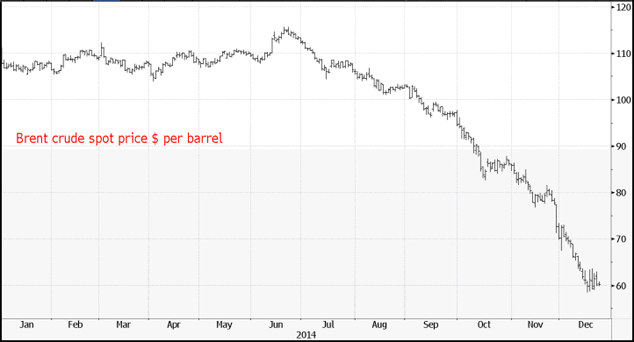
And as we exit 2014, the Saudi oil minister told the FT this morning that "the world may never see $100 a barrel oil again", and warned that even if oil falls to $20 a barrel, Opec will not cut production.
If there were any doubts before, it's crystal clear now we've got a good old-fashioned price war on our hands. The Saudis are determined to put their rivals across the world, particularly in the US shale fields, out of business.
A lower oil price is good news for consumers. But an uncontrolled plunge is bound to rattle financial markets. Because as Jared Dillian of Mauldin Economics puts it: "when markets move fast, stuff blows up".
From junk bonds to economies over-reliant on oil (see below), this is bound to have major consequences. Expect this to remain a big story throughout 2015.
The rouble: the first of many casualties
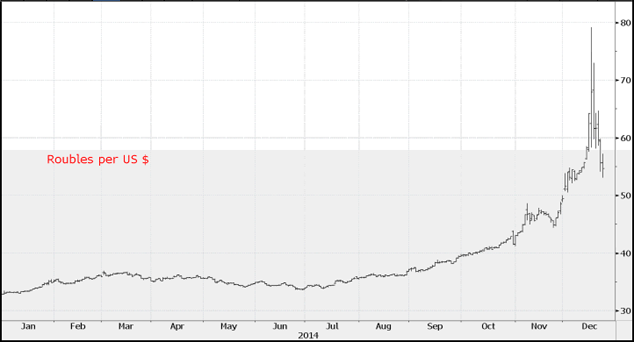
As Tim Price noted at our recent Roundtable discussion (out in the next issue of MoneyWeek on 30 December), it's hard to believe that there isn't a single big player out there suffering because of all this. In the 1998 Russian default crisis, hedge fund LTCM blew up, triggering one of Alan Greenspan's earliest crusades to save Wall Street. Will it really be different this time?
The Japanese central bank's balance sheet: it's only getting bigger
The government had a choice. Stick with the already whopping QE package they had? Or twist and show investors they really, really meant business?
In October, they opted to twist, with the Bank of Japan promising to pump even more money into the Japanese economy. The prime minister, Shinzo Abe, then called a snap election, seeking and getting approval from the voters to continue down the inflation or bust' route.
As the chart below shows, the BoJ's balance sheet is already expanding rapidly, and more so than any other central bank.
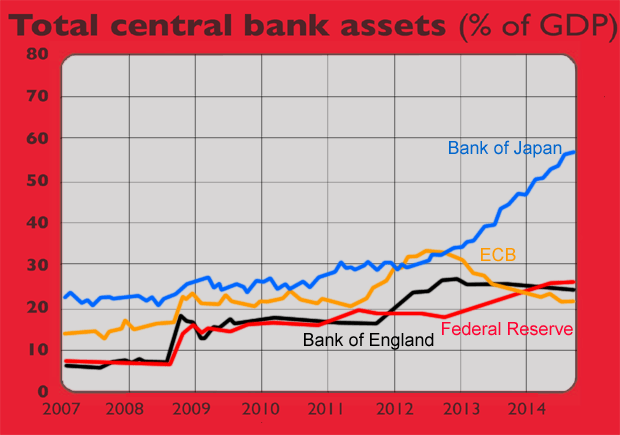
Will it work? We happen to think that Japan will get better over the year ahead. But from an investment point of view, it doesn't matter. The choice is pretty clear Japan will do what it takes to keep the market rising, and if that means more money printing, so be it.
The Chinese stock market: this one can run and run
2014 is the year that everyone came to terms with China's economy slowing. Even the most ardent China bulls couldn't deny that the days of double-digit Chinese growth and endless consumption of resources were at an end.
However, proving the point that economic growth and stock market growth have got absolutely nothing to do with one another or putting that perhaps more accurately, that there is no correlation between the two China is the best-performing stock market of the year, up around 50%.
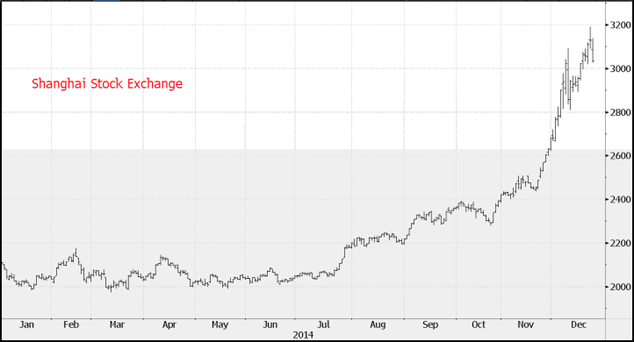
Why? It's partly because the market has been opened up more to foreign investors. And it's partly because the government wants savers to rely more on the stockmarket and less on the property market. But it's also because China was extremely cheap at the start of the year. And we think it remains good value now.
London property: the tipping point
Finally, we can't ignore the good old British property market. The old saying, "you can't go wrong with bricks and mortar" is baked into the British psyche perhaps more than any other.
And there's no more fool-proof bet than London property. It's a global market. London's practically a different country (and there have been plenty of calls for secession from the shires this year by the metropolitan elites'). Everyone wants a piece of the British capital, with its reliable rule of law and its good schools and great divorce courts.
And yet, it seems that there's a maximum that people are willing to pay, even for a foothold within the veritable paradise that is London. As the chart below showing the annual change in Rightmove asking prices in Greater London shows, price growth is showing signs of slowing.
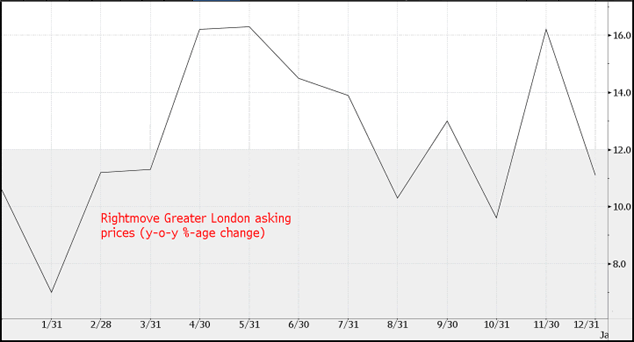
New mortgage requirements have capped borrowing for many. A strengthening pound put an end to bargain prices for many foreign buyers. An increasingly hostile tax environment at the top end of the market has hit demand for trophy properties. Soaring prices have even boosted supply at least at the top end.
So is 2015 the year that London property finally rolls over? We'll soon find out but if nothing else, it certainly looks as though you'll get much better value elsewhere in the UK.
This is the last Money Morning before Christmas. We'll be sending you a few emails over the holiday period about getting your finances in order for 2015, and then your regular Money Morning starts back on 5 January.
Get the latest financial news, insights and expert analysis from our award-winning MoneyWeek team, to help you understand what really matters when it comes to your finances.

-
 Should you buy an active ETF?
Should you buy an active ETF?ETFs are often mischaracterised as passive products, but they can be a convenient way to add active management to your portfolio
-
 Power up your pension before 5 April – easy ways to save before the tax year end
Power up your pension before 5 April – easy ways to save before the tax year endWith the end of the tax year looming, pension savers currently have a window to review and maximise what’s going into their retirement funds – we look at how